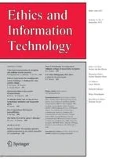Abstract
Although commonly confused, the values inherent in copyright policy are different from those inherent in scholarly standards for proper accreditation of ideas. Piracy is the infringement of a copyright, and plagiarism is the failure to give credit. The increasing use of Web-based electron publication has created new contexts for both piracy and plagiarism. In so far as piracy and plagiarism are confused, we cannot appreciate how the Web has changed the importance of these very different types of wrongs. The present paper argues that Web-based publication lessens the importance of piracy, while it heightens the need for protections against plagiarism. Copyright policy protects the opportunity for publishers to make a profit from their investments. As the cost of publication decreases in the electronic media, we need fewer copyright protections. Plagiarism is the failure to abide by scholarly standards for citation of sources. These standards assure us that information can be verified and traced to its source. Since Web sources are often volatile and changing, it becomes increasingly difficult and important to have clear standards for verifying the source of all information.
Similar content being viewed by others
References
Arthur Austin. The Reliability of Citation Counts in Judgments on Promotion, Tenure, and Status. Arizona Law Review 35, 1993.
S. Breyer. The Uneasy Case for Copyright. Harvard Law Review 84, 1970.
Fred Cate et al. Copyright Issues in Colleges and Universities. Academe, May/June 1998.
Cross Industry Working Team. Managing Access to Digital Information: An Approach Based on Digital Objects and Stated Operations. 〈www.xiwt.org/documents/MagagAccess/ManagAcess.html〉, May 1997, accessed July 1998.
Electronic References and Scholarly Citations of Internet Sources. 〈www.gu.edu.au/gint.WWWVL/OnlineRefs.html.
Mary Ellen Guffey. APA style Electronic Formats. Business Communication Quarterly, 〈www.westwords.com/guffey/apa_z.html〉, March 1997, accessed July 1998.
Andrew Harnack and Gene Kleppinger. Beyond the MLA Handbook: Documenting Electronic Sources on the Internet. 23rd Conference, Kentucky Philological Association, 〈falcon.eku.edu/honors/beyond-mla〉, November 1996, accessed July 1998.
International Standardization Organization. Excerpts from ISO Standard 690-2, 〈www.nlc-bnc.ca/iso/tc46sc9/standard/696-2c.html〉, 1997, accessed July 1998.
Thomas Jefferson. Letter to Isaac M'Pherson, Aug 13, 1813. The Writings of Thomas Jefferson. Taylor & Maury, vol 6. 1854.
Larr Kusche. The Bermuda Triangle Mystery Solved. Prometheus Books, 1995.
Joshua Kwan. Nascent Electronic Book Field Already Seems Crowded. Wall Street Journal, July 30, 1998.
Joan Latchaw and Jeffrey Galin. Shifting Boundaries of Intellectual Property: Authors and Publishers Negotiating the WWW. Computers and Composition 15(12), 1998.
Lia Li and Nancy Crane. Electronic Style: A guide to Citing Electronic Information, 1993.
Charles McManis. Unfair Trade Practices 3rd Ed. West Publishing, 1992.
l.P. Prosser et al. Casebook on Torts. Foundation Press, 1982.
Ellen Schrecker. Technology and Intellectual Property. Academe, May/June 1998.
Peter Shaw. Plagiarism. American Scholar 51, 1982.
Henrietta Shirk and Howard Smith. Emerging Fair Use Guidelines for Multimedia: Implications for the Writing Classroom. Computers and Composition 15(2), 1998.
K.R. St. Onge. The Melancholy Anatomy of Plagiarism. University Press, 1988.
Laurie Sterns. Copy Wrong: Plagiarism, Process, Property, and the Law. California Law Review 80, 1992.
Working Group on Intellectual Property Rights for the White House National Information Infrastructure Task Force. 〈www.uspto.gov/web/offices/com/doc/ipnii〉, 1995, accessed Aug 1998.
Marilyn V. Yarbrough. Do As I Say, Not As I Do: Mixed Messages for Law Students. Dickenson Law Review 100(3), 1996.
Law Cases
Feist Publications, Inc. v Rural Telephone Service Co., 499 U.S. 340, 1991.
International News Service v Associated Press, 39 SC 38, 1918.
Jacobelis v. Ohio, 378 US 197, 1964.
Narell v. Freeman 872 F.2nd 907.
Author information
Authors and Affiliations
Rights and permissions
About this article
Cite this article
Snapper, J.W. On the Web, plagiarism matters more than copyright piracy. Ethics and Information Technology 1, 127–135 (1999). https://doi.org/10.1023/A:1010083703905
Issue Date:
DOI: https://doi.org/10.1023/A:1010083703905




